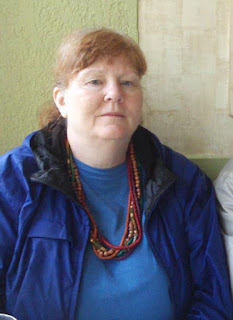Spring: Fat Woman Body
I
am not comfortable in my fat body.
I
feel shame in my fatness.
Anyone
who has been fat understands what it’s like to navigate the public arena; the
psychological aspects are much worse than the physical limitations of a fat
body, which can be considerable.
In
a world designed primarily, and unapologetically, for the slender, watching out
for physical barriers is an on-going worry: tight spaces, small cars, elevators,
crowded public transportation (airplanes, especially), and skimpy chairs
designed to hold bodies up to 250 pounds – that is, if one is lucky.
Once,
when I was on my Fulbright in Macedonia, where the population is still
relatively slender (although this is rapidly changing), and dining in a small
Italian restaurant, I stood up from a rickety plastic armchair to leave, and
the chair arose with me. Everyone knows that a chair is not supposed to be a
fashion accessory for the posterior, but there I was, sporting a white chair,
no less, and trying to wiggle out of it, while everyone watched – at least that
was my perception.
Unlike
in the U.S., I was the fattest person, a curiosity, in that restaurant.
Yes,
fat people are always comparing themselves to other fat people, trying to
assure themselves that they are skinnier than that woman (usually another woman) across the room. But in that
restaurant, I was the fattest one
there, the ugly, vulgar American who consumes too much.
We
are the worst judges of other fat people, scrutinizing and tsk tsking over
other fat bodies, relief that, at least, we are not them.
Our
fears about public scrutiny are not unwarranted.
We
all know about the whispering, the eyerolling, the snickering, the smirking, the
pointing, and the outright laughing – almost always girls and women (who truly
believe that they are being subtle with their barbs).
Outright
rude strangers, almost always young males, will not hesitate to give loud voice
to what others are most certainly thinking: “You’re a fat pig,” “Off to the hog
trough,” “Caution: Wide Load,” and worse.
Once,
at a mall, some 13- or 14-year-old boys shot rubber bands at my butt.
Adorable
little jerks.
Childhood
echoes of the verbal abuse I suffered at the behest of my male cousins and
schoolmates: “Fatty, fatty, two by four, couldn’t get through the kitchen door”
and their pet name for me: “Jeffer the Heifer.”
Such
echoes still cut deep, even though I have been told that it’s time to move on.
Well,
buttercups, I get to decide when, and if ever, I plan to let go of that past and
my feelings about it and work on that forgiveness thingy.
So
far, no one has ever asked me for it.
<Crickets
chirping>
Even
the straightforward comment, “You’re too fat,” is not really an objective
statement of fact, but a moral judgment with an overlay of gluttony and excess
in all things.
Okay,
when my doctor says it, she is well-meaning and does have my best interests at
heart, but, even then, there is a tinge of societal judgment, the “shoulds” of
body composition not being met as a Good Patient.
Here’s
the rub: even as a fat woman, my physical condition is stubbornly robust and
healthy, perhaps with a slightly elevated blood pressure and cholesterol –
conditions that in thin people would be pooh poohed as normal for the aging
body.
Then
there are the cute little strangers: children too young to have developed a
social filter but old enough to have been inundated with ads featuring skinny
Madison Avenue models questioning the sizes of their butts.
My
favorite: the innocent and yet direct question:
“Why
are you so fat?”
The
red-faced mother in the background, trying to shush her child, not because the
child asked what she thought was a pertinent question, but because the mother
was embarrassed that the child had voiced the mother’s own prejudices so
pointedly.
The
child is simply the objective conduit, laying bare societal views about fat and
obese people.
Yes,
the psychological aspects of fat are far worse than the physical barriers,
which, with some will and minimal cost, can be fixed (and have been, in some respects):
wider and sturdier chairs; chairs without arms; restaurant booths with wider
spaces between seats and tables.
That
is not to say that the fat body doesn’t offer its physical challenges.
It
does.
I
can barely lift a 50-pound bag of salt; mostly I just pull it from the car
trunk and allow it to plop to the ground (and hope it doesn’t burst open), drag
it to its carport destination, and with some help, roll it into the square
container where we keep the winter salt.
Yet
my fat body often carries at least 50 pounds of extra weight – sometimes more.
Slogging
around all those extra pounds is not easy on a body.
One
could argue all day that living flesh weighs differently than inert objects of
the same weight, but, contrary to popular belief, they weigh the same.
Weight
is weight.
Too
much of it has detrimental effects on our physical well-being. That is
irrefutable.
A
fat woman walking and carrying 200 pounds exerts 300 pounds on her knee joints
– sooner or later, something will have to give, and mobility will soon be
diminished.
And
then there are the heart, which must pump blood through veins and arteries not
designed to support extra flesh, and the lungs, which must deliver oxygen to
the brain and muscles – and fat.
Etcetera
and blah, blah, blah…
With
our knowledge base of basic nutrition and how the body works and moves, we fat
people could earn an advanced degree in anatomy and physiology.
Which
begs the question: why do we have so much difficulty losing and keeping excess
weight off?
Why
is controlling our appetite so problematic?
Why
is food such an obsession?
Why
do we gain weight so easily, while our skinny friends and family eat like
horses and never gain an ounce?
Why
do the skinnies not understand how and why food and weight take an out-sized
place in our lives?
Recently,
an always-been-skinny relative said to me, “You’re on vacation; you should be
able to eat whatever you want.”
How
can I tell her that I can never take
a vacation from following a food plan because if do, I’ll even grow fatter?
That
going off plan for an extended period does not just represent a significant
weight gain, but will also create a cascading psychological effect, which will
likely result in a years-long binge?
That
I, too, don’t understand the whys and hows of the way I am?
So
the physical aspects are the least of it.
If
our culture were more accepting of fat people, I am convinced there would be
fewer fat people.
Instead
of castigating fat people for being weak-willed and unable to control their
appetites, the medical field could be working on finding ways to help people
lose weight without offering moral judgments, either implicitly or explicitly.
If
there is any good news for fat people, it is this: we are no longer a minority.
In
the U.S., it is estimated that two-thirds of all adults are overweight,
one-third of them meeting the Body Mass Index (BMI) test for obesity.
With
those numbers, we should rise up and demand
better treatment and adequate accommodations for our bodies, particularly on
airliners, where people of size are still treated like second-class citizens.
Unfortunately,
we still cower in our corners, telescoping our shame for taking up “too much
space.”
One
group of activists is trying to bring about change for how people of size are
treated: The National Association for the Advancement of Fat People (NAAFA).
If
I were truly a brave person, I would join.
But
I’m a coward.








Comments